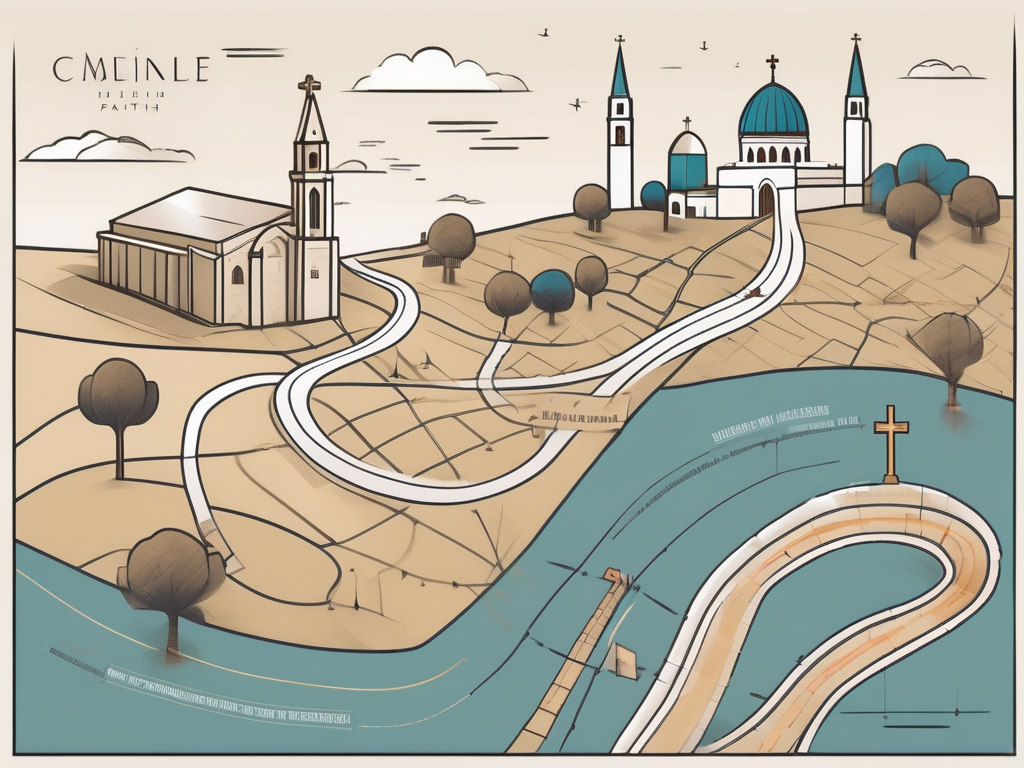The early history of the Church is filled with intrigue, transformation, and moments that shaped Christianity as we know it today. Understanding this crucial period can shed light on the origins of our faith and the challenges faced by the early believers. In this article, we will dive into the captivating world of early Church history and explore key events, theological developments, the growth of Christianity, and the resilience of early believers in the face of persecution. Let us embark on this journey and uncover the remarkable story that led to the establishment of the Church as we know it.
Understanding the Birth of the Early Church
The birth of the early Church can be traced back to the life and teachings of Jesus Christ and his apostles. These men played a vital role in establishing the foundation of the Church and spreading the message of the Gospel. The apostles, including Peter, James, and John, were chosen by Jesus himself to carry on his work and proclaim the Good News to the world.
However, the early Church faced numerous challenges, including opposition from the Roman Empire. The Roman authorities viewed the growing Christian movement as a threat and sought to suppress it. Despite facing persecution and hostility, the early believers remained steadfast in their faith and continued to spread the message of Christ.
The Role of Apostles in Establishing the Church
The apostles played a pivotal role in the establishment of the early Church. They served as leaders and guides, nurturing the early Christian communities and ensuring the faithful adherence to the teachings of Jesus. The apostles performed miracles, preached the Gospel, and ordained leaders within the Church.
One of the most prominent apostles was Peter, who was considered the leader of the apostles. He played a crucial role in the early Church, being the first to proclaim the Gospel on the day of Pentecost, where thousands of people were converted to Christianity. Peter’s boldness and unwavering faith inspired others to follow in his footsteps.
James, the brother of Jesus, also held a significant position within the early Church. He was known for his wisdom and was considered one of the pillars of the Church in Jerusalem. His leadership and teachings helped to solidify the early Christian community and establish a strong foundation.
John, often referred to as the beloved disciple, was known for his close relationship with Jesus. He played a crucial role in preserving and spreading the teachings of Jesus through his writings, including the Gospel of John, the three epistles, and the book of Revelation. John’s writings provided valuable insights into the life and teachings of Jesus, which became essential for the early Church.
Through their tireless efforts, the apostles laid the groundwork for the growth and expansion of Christianity. Their unwavering dedication and unwavering commitment to the mission of Christ were truly remarkable, and their influence can still be felt in the Church today.
The Influence of the Roman Empire
The Roman Empire was a dominant force during the time of the early Church, and its influence shaped the development of Christianity. Initially, the Roman authorities saw the Christian movement as a sect within Judaism and allowed it some degree of freedom. However, as the Christian community grew, it began to pose a threat to the traditional Roman religious practices.
This led to a shift in the attitude of the Roman Empire towards the Christians. They faced persecution, which ranged from social ostracism to imprisonment and even death. The early believers were subjected to various forms of torture and martyrdom for their refusal to renounce their faith.
Despite these challenges, the early Church persevered and continued to spread its message, adapting to the changing circumstances and finding strength in their faith. The persecution they faced only served to strengthen their resolve and commitment to the teachings of Jesus.
As Christianity spread throughout the Roman Empire, it encountered different cultures and traditions. The early Church had to navigate these diverse contexts, adapting its practices and teachings to resonate with the local population while remaining faithful to the core principles of the Gospel. This process of inculturation allowed Christianity to take root and flourish in various regions, contributing to its growth and expansion.
Furthermore, the Roman Empire’s infrastructure, including its extensive road network and common language, facilitated the spread of Christianity. Missionaries and early Christian leaders were able to travel and communicate more effectively, enabling the Gospel message to reach distant regions and establish new Christian communities.
In conclusion, the birth of the early Church was a result of the life and teachings of Jesus Christ and the dedicated efforts of his apostles. Despite facing opposition from the Roman Empire, the early believers remained steadfast in their faith and continued to spread the message of Christ. The apostles played a crucial role in establishing the Church and nurturing the early Christian communities. The influence of the Roman Empire, while initially hostile, eventually contributed to the growth and expansion of Christianity. The early Church’s ability to adapt to different cultural contexts and its utilization of the Roman Empire’s infrastructure were instrumental in the spread of the Gospel.
Key Events and Turning Points in Early Church History
The early Church witnessed several pivotal events that shaped its trajectory and set the stage for future developments. One such event was the Council of Nicaea in 325 AD. This gathering of bishops aimed to address the issue of Arianism, a heretical teaching that denied the divinity of Christ. The council affirmed the divinity of Jesus and established the groundwork for the Nicene Creed, a statement of faith still recited by many Christians today.
The Council of Nicaea played a crucial role in defining Christian beliefs and shaping the future of the Church. The council not only addressed the Arian heresy but also established the date of Easter, enacted disciplinary measures for clergy, and reiterated the authority of bishops in their respective dioceses.
This gathering of bishops highlighted the importance of unity and doctrinal clarity within the Church. The decisions made at the Council of Nicaea had a profound impact on the development of Christian doctrine and laid the foundation for future theological debates.
Another significant turning point in early Church history was the Great Schism between the Eastern and Western branches of Christianity in 1054 AD. The division resulted from theological and cultural differences between the Roman Catholic Church in the West and the Eastern Orthodox Church in the East. This split had long-lasting repercussions and shaped the religious landscape of Europe and the world.
The Great Schism marked a significant divide within Christianity that persists to this day. The theological disagreements between the Roman Catholic Church in the West and the Eastern Orthodox Church in the East were further compounded by political and cultural differences.
The schism had far-reaching consequences, resulting in the formation of two distinct branches of Christianity. Each branch developed its own unique traditions, liturgies, and ecclesiastical structures, leading to a lasting divide between the Eastern and Western churches.
While the Council of Nicaea and the Great Schism are two key events in early Church history, there are numerous other significant moments that shaped the development of Christianity. One such event is the conversion of Emperor Constantine to Christianity in the early 4th century. This event not only brought about a shift in the religious landscape of the Roman Empire but also paved the way for the eventual establishment of Christianity as the state religion.
Another important event is the martyrdom of early Christian figures such as St. Stephen and St. Polycarp. Their willingness to die for their faith served as a powerful testimony to the strength and conviction of early Christians, inspiring future generations to stand firm in their beliefs.
The spread of Christianity beyond the borders of the Roman Empire is also a significant aspect of early Church history. Missionaries such as St. Patrick, St. Augustine of Canterbury, and St. Cyril and Methodius played instrumental roles in bringing Christianity to new regions and cultures, contributing to the growth and expansion of the Church.
Furthermore, the development of monasticism in the early Church, with figures like St. Anthony of Egypt and St. Benedict of Nursia, brought about a new form of devotion and spiritual discipline. Monastic communities became centers of learning, preserving ancient texts and contributing to the intellectual and cultural development of the Church.
These are just a few examples of the many key events and turning points in early Church history. Each event, whether it be a council, a schism, a conversion, or a martyrdom, played a significant role in shaping the beliefs, practices, and institutions of Christianity, leaving a lasting impact on the Church as it continues to evolve and grow.
Theological Developments in the Early Church
As the early Church grew and encountered new challenges, theological developments became necessary to clarify essential Christian beliefs and address emerging heresies. One crucial aspect of theological development was the establishment of the New Testament canon.
The Formation of the New Testament Canon
The formation of the New Testament canon was a gradual process that spanned several centuries. Early Christians relied on oral tradition, letters, and the Old Testament scriptures to guide their faith and practice. However, as time went on, there was a need to compile authoritative writings that would serve as a standard for Christian doctrine.
Through careful discernment and consensus, the early Church recognized certain writings as inspired and authoritative. The resulting New Testament canon became a cornerstone of Christian belief, providing guidance for generations to come.
The Evolution of Church Doctrine
Alongside the development of the New Testament canon, the early Church also faced the task of clarifying and defining essential doctrines. This process involved engaging in theological discourse, addressing emerging controversies, and crafting statements of faith known as creeds.
Church leaders such as Augustine and Athanasius played significant roles in defending orthodox Christian beliefs and refuting heretical teachings. The early Church wrestled with concepts such as the nature of God, the divinity of Christ, and the role of the Holy Spirit. These theological developments shaped the foundation of Christian doctrine and provided a framework for understanding the mysteries of the faith.
The Growth and Spread of Christianity
One of the most remarkable aspects of early Church history is the rapid growth and spread of Christianity. Despite facing opposition, the early believers were zealous in sharing their faith and fulfilling the Great Commission to make disciples of all nations.
The Role of Missionaries in Church Expansion
Missionaries played a crucial role in the expansion of the early Church. These dedicated individuals traveled far and wide, preaching the Gospel, establishing new Christian communities, and baptizing converts.
Notable figures such as Paul, who undertook several missionary journeys, and Patrick, who brought Christianity to Ireland, left an indelible mark on the growth of the Church. Their tireless efforts and unwavering commitment to spreading the Good News laid the groundwork for Christianity to become a global phenomenon.
The Church’s Influence on Society and Culture
As Christianity spread, it began to influence society and culture in profound ways. The early Church placed a strong emphasis on caring for the poor, promoting justice, and providing support for those in need.
The Church’s influence extended beyond its religious practices to various aspects of daily life. The establishment of monastic communities, the development of educational institutions, and the preservation of ancient texts all contributed to the shaping of Western civilization.
Persecution and Martyrdom in the Early Church
The early Church faced intense persecution under the Roman Empire, resulting in the persecution and martyrdom of countless believers. The refusal to worship the Roman gods and the proclamation of Jesus as Lord often led to severe consequences for early Christians.
The Persecution under Roman Rule
The Roman authorities viewed Christianity as a threat to their power and sought to suppress it through various means. Christians were subjected to imprisonment, torture, and execution. They were forced to renounce their faith or face dire consequences.
Despite the immense suffering endured by early believers, their steadfastness and courage became a powerful testimony to the strength of their faith. The stories of the martyrs continue to inspire Christians around the world, reminding us of the price that was paid for our freedom to worship.
The Legacy of Early Church Martyrs
The legacy of the early Church martyrs is one of courage, sacrifice, and unwavering devotion to Christ. Their willingness to face persecution and even death rather than renounce their faith left a lasting impact on the Church.
Their example inspires us to remain faithful in the face of adversity and trials. The early Church martyrs remind us of the cost of discipleship and stir us to live out our faith boldly in the world today.
As we reflect on the fascinating early Church history, we are reminded of the resilience, passion, and commitment of the early believers. They navigated uncertain times and faced immense challenges, but their unwavering faith paved the way for the growth and development of Christianity.
Today, we are beneficiaries of their faith and perseverance. We stand on the shoulders of giants who have passed down a rich legacy of faith and devotion. As we explore the history of the early Church, let us honor their memory by embracing our own call to be faithful witnesses of Christ in our time.












